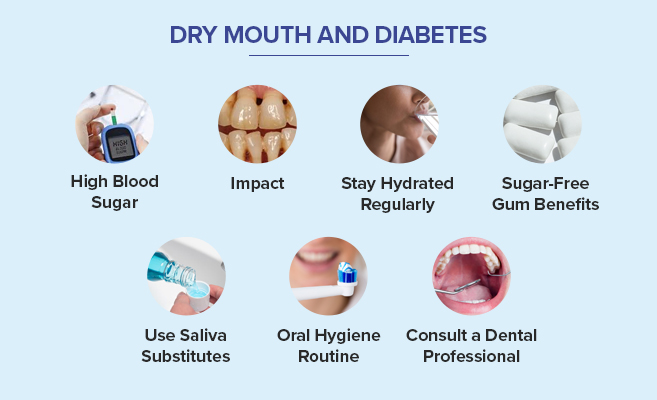Dry Mouth and Diabetes: Symptoms, Causes and Treatment

Living with diabetes can bring about a variety of challenges, from monitoring blood sugar levels to managing diet and exercise. One commonly overlooked issue that many diabetics experience is dry mouth and diabetic symptoms. This condition can be uncomfortable, disruptive, and in some cases, indicate underlying complications related to diabetes. In this blog, we will explore the relationship between dry mouth & diabetes: causes, symptoms, and treatment options.
Understanding this connection is essential not just for comfort but also for maintaining oral health and preventing further health issues.
What is Dry Mouth?
Dry mouth, also known as xerostomia, occurs when the salivary glands do not produce enough saliva to keep the mouth moist. Saliva plays an important role in digesting food, maintaining oral health, and protecting teeth from decay. Without adequate moisture, the mouth can feel sticky, and there is a higher risk of developing cavities and infections.

How Does Diabetes Contribute to Dry Mouth?
People with diabetes are more prone to dry mouth and diabetic symptoms for several reasons. Chronic high blood sugar levels can reduce saliva production, leading to dry mouth. Additionally, medications used to manage diabetes, such as diuretics, may also have a drying effect on the mouth. Let’s delve deeper into the causes:
1. High Blood Sugar Levels:
When blood sugar levels are poorly controlled, the body loses fluids in the form of urine. This leads to dehydration, which can reduce the production of saliva and cause dry mouth & diabetes: causes.
2. Medication Side Effects:
Diabetes medications, especially those used to control high blood pressure or manage other symptoms, often come with the side effect of dry mouth. This can worsen oral health issues and contribute to discomfort.
3. Nerve Damage:
Over time, diabetes can damage the nerves that control the salivary glands. This can result in reduced saliva production, causing a persistently dry mouth.
Symptoms of Dry Mouth in Diabetics:
The symptoms of dry mouth can vary from mild to severe, and can significantly impact your quality of life. In diabetics, the symptoms often overlap with other health concerns, making it even more important to recognize them. Common symptoms include:
- Sticky or dry feeling in the mouth
- Difficulty swallowing or speaking
- Sore throat
- Cracked lips or sores in the mouth
- Bad breath
- Dry or burning sensation on the tongue
- Increased thirst
If you are experiencing these symptoms frequently, it’s essential to seek treatment to address the root cause.
Dry Mouth and Diabetes Treatment Options:
Managing dry mouth and diabetic symptoms involves a combination of approaches, including lifestyle changes, medication adjustments, and oral hygiene routines. Here are some effective ways to manage the condition:
1. Controlling Blood Sugar Levels:
The most effective way to prevent and reduce dry mouth symptoms is to manage your diabetes properly. By keeping your blood sugar levels within a healthy range, you can reduce the risk of dehydration and saliva production issues. Regular monitoring and consultation with a healthcare provider are crucial in achieving optimal blood sugar control.
2. Staying Hydrated:
Drinking plenty of water is vital for keeping the mouth moist and preventing dehydration. Carry a water bottle with you throughout the day and sip regularly, especially if you notice your mouth becoming dry.
3. Using Saliva Substitutes:
Over-the-counter saliva substitutes, available in the form of sprays or gels, can help keep the mouth moist. These products are formulated to mimic the function of saliva, providing relief from dryness.
4. Chewing Sugar-Free Gum:
Chewing sugar-free gum or sucking on sugar-free candies can stimulate saliva production, providing temporary relief from dry mouth. Look for gum or candies containing xylitol, as it can help reduce the risk of cavities as well.
5. Maintaining Good Oral Hygiene:
For diabetics, it’s especially important to maintain a strict oral hygiene routine. Brush and floss regularly, and use fluoride toothpaste to protect your teeth from decay. Regular visits to your dentist for checkups and cleanings are essential in managing dry mouth and diabetes treatment.
6. Consulting a Dental Professional:
If you are experiencing persistent dry mouth, it’s important to consult a dentist or doctor. A dental professional can help address the issue and recommend appropriate treatments. Look for a dental clinic near me or a dental hospital near me with experience in handling diabetes-related oral health issues.
The Link Between Dry Mouth and Other Oral Health Issues:
Diabetics are more prone to several oral health conditions due to dry mouth. Some of the most common issues include:
- Tooth decay: Reduced saliva means that there is less natural protection for your teeth, making them more vulnerable to cavities.
- Gum disease: The lack of saliva can also contribute to the development of gum disease, which can lead to further complications if not treated promptly.
- Oral infections: Dry mouth can increase the risk of developing fungal infections in the mouth, such as thrush.
Maintaining good oral health is essential to prevent these issues. If you’re looking for comprehensive dental care, you can find a best dental hospital in Chennai to address both dry mouth and general dental concerns effectively.
How Radiant Dental Care Can Help?
Radiant Dental Care offers a range of treatments to help manage dry mouth in diabetic patients. Their team of dental professionals is experienced in diagnosing and treating the effects of diabetes on oral health. By providing personalized care, Radiant Dental Care can help you manage dry mouth & diabetes: causes and recommend the most appropriate treatments for your unique needs.
Their services include regular dental checkups, cleaning, and expert advice on managing dry mouth. If you are dealing with dry mouth and diabetes treatment, Radiant Dental Care can help you find a solution that works for you.
If you have children or family members who are also affected by diabetes, it’s essential to pay attention to their oral health. Establishing a solid dental care routine for kids and parents alike can help prevent dry mouth and diabetic symptoms from becoming a larger issue. Regular dental visits can ensure that potential problems are caught early.
Conclusion!
Dry mouth and diabetic symptoms can be disruptive and uncomfortable, but with the right treatment and lifestyle changes, it is possible to manage this condition effectively. By controlling blood sugar levels, staying hydrated, and practicing good oral hygiene, you can reduce the impact of dry mouth. Additionally, regular consultations with a dentist or healthcare professional can help you prevent further complications.
If you’re experiencing dry mouth & diabetes: causes or need assistance with dry mouth and diabetes treatment, it’s essential to seek guidance from a trusted dental clinic or hospital. Whether you’re searching for a dental clinic near me or looking for the best dental hospital in Chennai, Radiant Dental Care is here to support you on your journey to better oral health.
If you are experiencing the discomfort of dry mouth or any other oral health issues related to diabetes, don’t wait—schedule an appointment with Radiant Dental Care today! Their team of experts is ready to help you maintain a healthy smile and manage your diabetes-related symptoms with personalized care.
Frequently Asked Questions:
What causes dry mouth in diabetics?
Ans. Dry mouth in diabetics is caused by high blood sugar levels, dehydration, medication side effects, and nerve damage to salivary glands.
How can I treat dry mouth caused by diabetes?
Ans. Treatment includes controlling blood sugar, staying hydrated, using saliva substitutes, chewing sugar-free gum, and maintaining good oral hygiene.
Can dry mouth cause dental issues?
Ans. Yes, dry mouth increases the risk of tooth decay, gum disease, and oral infections due to the lack of saliva protection.
How can I prevent dry mouth in diabetes?
Ans. Regularly monitor blood sugar levels, drink plenty of water, and use oral products to stimulate saliva production.
Is dry mouth a sign of poor diabetes control?
Ans. Yes, persistent dry mouth can indicate poorly controlled blood sugar levels and may require medical attention.

 +91 9513446186
+91 9513446186
